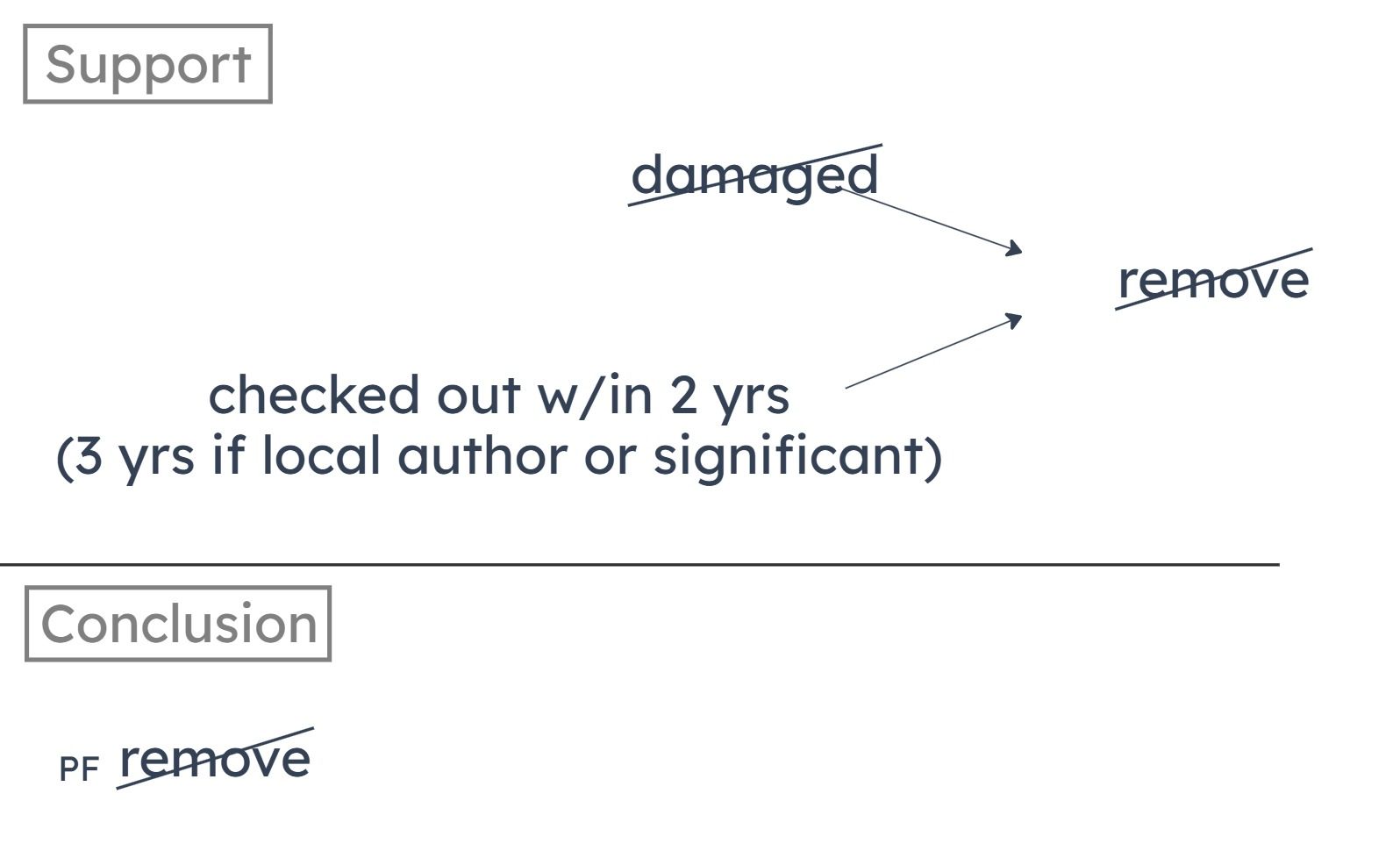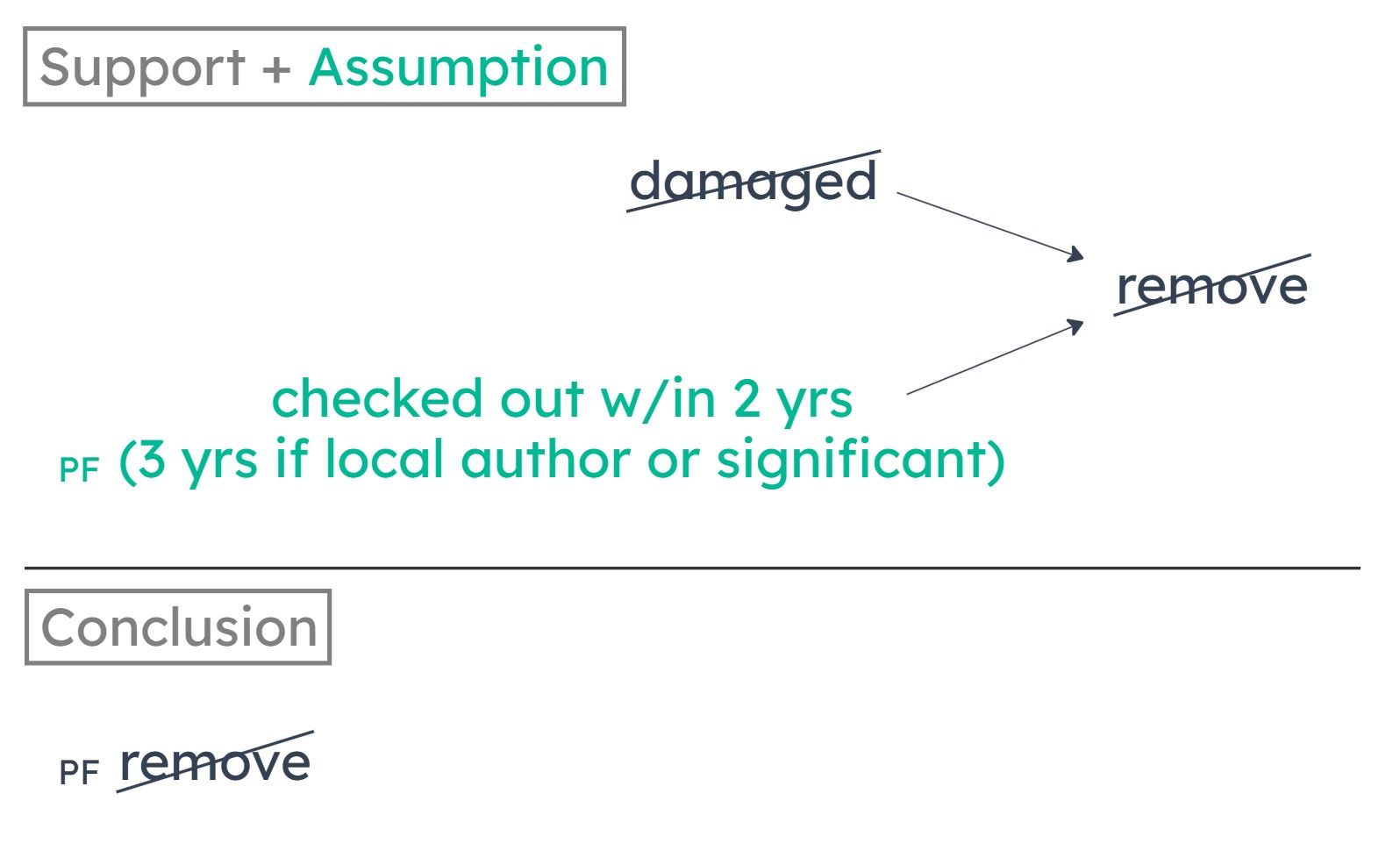Library policy: For a book to be removed from circulation, the book must be badly damaged and must not have been checked out for over two years. Books that are either written by local authors or are considered to be of significance to local history can only be removed from circulation if they have not been checked out for over three years.
Application: Paper Flowers should not be removed from circulation.
Summary
The conclusion is that Paper Flowers should not be removed. This is based on the following rules:
In order for a book to be removed, it must be (1) badly damaged, AND (2) not been checked out for over 2 years.
If a book is written by a local author OR considered significant to local history, then this additional rule applies:
In order for the book to be removed, it must not have been check out for over 3 years.
Missing Connection
We want to prove that Paper Flowers should not be removed. So we want to show (1) it was not badly damaged, OR (2) it has been checked out within 2 years.
If the book is written by a local author OR considered significant to local history, then we want to show (1) it was not badly damaged, OR (2) it has been check out within 3 years.
A
Paper Flowers is badly damaged.
(A) tells us that Paper Flowers satisfies one of the necessary conditions for being removed. That doesn’t establish that Paper Flowers should be removed.
B
Paper Flowers has been checked out within the last year.
(B) establishes that we do not meet one of the necessary conditions for being removed. Regardless of whether the book is significant to local history or by a local author, if the book has been checked out in the last year, then it hasn’t met the condition of “not been checked out for over 2 years” or “not been checked out for over 3 years.” So it shouldn’t be removed.
C
Paper Flowers was last checked out between two and three years ago.
(C) isn’t enough to prove Paper Flowers should be removed if the book isn’t by a local author and isn’t important to local history. That’s because if it is by a local author/important to local history, it just needs to be checked out within the last 3 years to be removed.
D
Paper Flowers was written by a local author.
(D) doesn’t tell us whether the book is badly damaged or hasn’t been checked out in the last 3 years. So we don’t know whether any of the necessary conditions for removal haven’t been met.
E
Paper Flowers was not written by a local author, but is considered to be of significance to local history.
(E) doesn’t tell us whether the book is badly damaged or hasn’t been checked out in the last 3 years. So we don’t know whether any of the necessary conditions for removal haven’t been met.
A
overlooks the possibility that a relatively small number of people can create a significant amount of new music
B
neglects to consider the ease with which music can be published on the Internet
C
fails to provide an alternative account of the sources for most of the music published on the Internet
D
presumes, without giving justification, that those who rework downloaded music into new creations always publish those new creations on the Internet
E
takes for granted that Internet users always prefer music that is original to music that has been downloaded and reworked into a new creation
The amygdala is not necessary for every experience of fear.
Thus, there must be other parts of the brain that can also sense fear.
In particular, the amygdala is not necessary to experience fear caused by breathing in carbon dioxide.
A
Extreme fear is not the only intense response that people can have to a breath that is high in carbon dioxide.
B
Sensing fear is not the only function the amygdala can serve.
C
Urbach-Wiethe disease is not the only disease that can destroy the amygdala.
D
The amygdala is not the only part of the brain that can be affected by Urbach-Wiethe disease.
E
The amygdala is not the only part of the brain that can be involved in sensing fear.